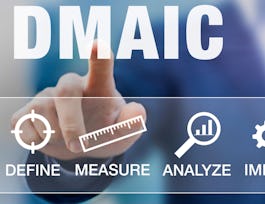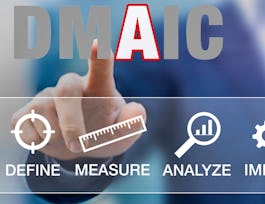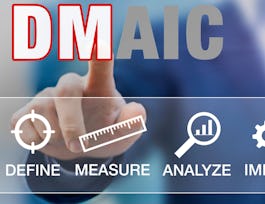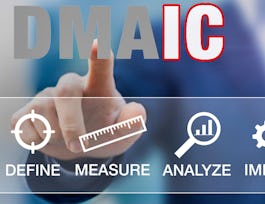This course will provide you will the tools necessary to complete the final components of the analyze phase as well as the improve and control phases of the Six Sigma DMAIC (Define, Measure, Analyze, Improve, and Control) process. This course is the final course in the Six Sigma Yellow Belt Specialization. You will learn about relationships from data using correlation and regression as well as the different hypothesis terms in hypothesis testing. This course will provide you with tools and techniques for improvement. You will also understand the importance of a control plan, as well as its key characteristics, for maintaining process improvements. Every module will include readings, discussions, lecture videos, and quizzes to help make sure you understand the material and concepts that are studied.


Six Sigma Tools for Improve and Control
This course is part of Six Sigma Yellow Belt Specialization
Taught in English
Some content may not be translated



Instructors: Christina Scherrer, PhD
41,791 already enrolled
Included with 
Course
(1,136 reviews)
91%
Details to know

Add to your LinkedIn profile
8 quizzes
Course
(1,136 reviews)
91%
See how employees at top companies are mastering in-demand skills

Build your subject-matter expertise
- Learn new concepts from industry experts
- Gain a foundational understanding of a subject or tool
- Develop job-relevant skills with hands-on projects
- Earn a shareable career certificate


Earn a career certificate
Add this credential to your LinkedIn profile, resume, or CV
Share it on social media and in your performance review

There are 5 modules in this course
Welcome to Six Sigma Tools for Improve and Control! This is the fourth course in the Six Sigma Yellow Belt Specialization. Your team of instructors, Dr. Bill Bailey, Dr. David Cook, Dr. Christine Scherrer, and Dr. Gregory Wiles, currently work in the College of Engineering and Engineering Technology at Kennesaw State University. The next two modules will conclude the Analyze phase of the DMAIC process and in the final two modules you will be introduced to the Improve and Control phase. This module will continue to discussion analysis by explaining correlation and regression. You will learn the meaning of correlation and regression, the different types of analysis, and how it can be used in Six Sigma.
What's included
5 videos5 readings2 quizzes
This the final module that covers the Analysis phase of the DMAIC process. Now that you have collected the data and calculated it you will need to determine how to make a statistical conclusion about your findings. In this module you will learn more about the importance of hypothesis testing, how to correctly do a hypothesis test reading as well as how to avoid errors, and statistical significance.
What's included
5 videos4 readings2 quizzes
This module will introduce you to the Improve and Control phase of the DMAIC process. The first step in this phase is determining improvement techniques to help make improvements to an organization. This module will cover the best and most popular improvement techniques including kaizen and kaizen blitz, PDCA (Plan-Do-Check-Act) cycle, and cost benefit analysis (including cost of quality).
What's included
6 videos5 readings2 quizzes1 discussion prompt
The final phase of the DMAIC process is the control phase. In this module you will learn about control tools that are useful in maintaining improvements. Communication is a key component of the control phase therefore it is important to develop standardized documentation. You will learn about how to standardize and manage documentation to help maintain processes that were implemented during the improve phase of DMAIC.
What's included
3 videos1 reading2 quizzes
This module is the "capstone project." You should only complete this project if you have taken all three previous yellow belt specialization courses (Six Sigma Fundamentals, Six Sigma Tools for Define and Measure, and Six Sigma Tools for Analyze), AND you want to complete this specialization. It should be noted that completing the Yellow Belt Specialization does not give the learner "professional accreditation" in Six Sigma. However, successful completion will assist in better preparation for such professional accreditation testing.
What's included
1 reading1 peer review
Instructors


Offered by
Recommended if you're interested in Business Essentials

University System of Georgia

University System of Georgia

University System of Georgia

University System of Georgia
Why people choose Coursera for their career




Learner reviews
Showing 3 of 1136
1,136 reviews
- 5 stars
80.22%
- 4 stars
16.08%
- 3 stars
2.19%
- 2 stars
0.61%
- 1 star
0.87%
New to Business Essentials? Start here.

Open new doors with Coursera Plus
Unlimited access to 7,000+ world-class courses, hands-on projects, and job-ready certificate programs - all included in your subscription
Advance your career with an online degree
Earn a degree from world-class universities - 100% online
Join over 3,400 global companies that choose Coursera for Business
Upskill your employees to excel in the digital economy
Frequently asked questions
Our applied curriculum is built around the latest handbook The Certified Six Sigma Handbook (2nd edition) and students will develop /learn the fundamentals of Six Sigma. Registration includes online access to all course content, projects, and resources. This price does not include the companion text The Certified Six Sigma Handbook (2nd edition).
Access to lectures and assignments depends on your type of enrollment. If you take a course in audit mode, you will be able to see most course materials for free. To access graded assignments and to earn a Certificate, you will need to purchase the Certificate experience, during or after your audit. If you don't see the audit option:
The course may not offer an audit option. You can try a Free Trial instead, or apply for Financial Aid.
The course may offer 'Full Course, No Certificate' instead. This option lets you see all course materials, submit required assessments, and get a final grade. This also means that you will not be able to purchase a Certificate experience.
When you enroll in the course, you get access to all of the courses in the Specialization, and you earn a certificate when you complete the work. Your electronic Certificate will be added to your Accomplishments page - from there, you can print your Certificate or add it to your LinkedIn profile. If you only want to read and view the course content, you can audit the course for free.


